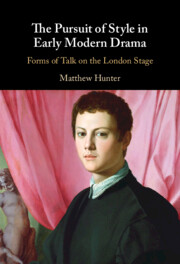
- Cited by 1
-
Cited byCrossref Citations
This Book has been cited by the following publications. This list is generated based on data provided by Crossref.
Deutermann, Allison K. 2024. Uncertainty and Understanding in the Early Modern English Theater. Modern Language Quarterly, Vol. 85, Issue. 1, p. 79.
- Publisher:
- Cambridge University Press
- Online publication date:
- August 2022
- Print publication year:
- 2022
- Online ISBN:
- 9781009042345




